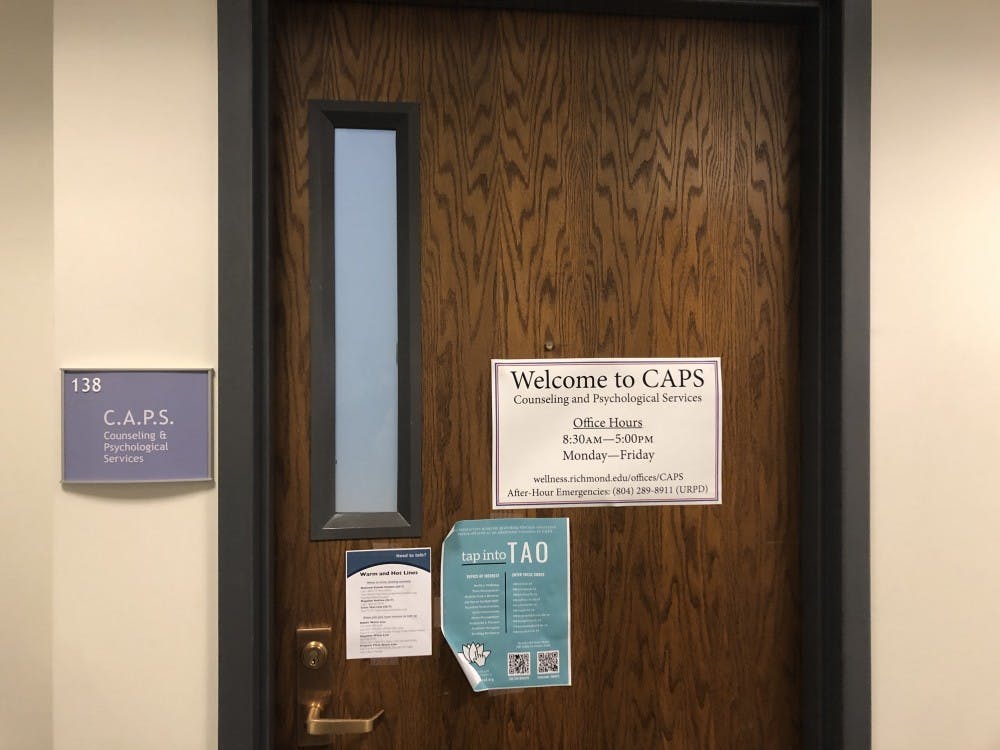University of Richmond students and faculty members are attempting to change the conversation regarding eating disorders and body positivity during National Eating Disorders Awareness Week.
The week officially runs from Feb. 25 to March 3. This year, the theme is “Come as You Are,” which highlights the National Eating Disorder Association’s goal of making the eating disorder community more inclusive, according to its webpage.
On UR’s campus, this will look like changing the conversation surrounding eating disorders to communicate that it is not only a women’s issue, said Dr. Charlynn Small, staff psychologist at Counseling and Psychological Services.
There are so many men who do not have a strong body image, and are therefore not getting the help they need, said Small, who also serves as chair of the university’s Eating and Body Image Concerns Team.
Eating disorders are portrayed in the media as being a rich, white, heterosexual woman’s disease, Lauren Costello, senior and CAPS intern, said.
“Mental disorders don’t know gender, they don’t know race, they don’t know sexuality, socioeconomic statuses — they affect everybody,” Costello said. “By having this conception of what you think this disorder entails in your head, you are potentially damaging the experiences and lives of people who don’t fit in that category.”
Junior Alex Carroll had to leave school during the fall semester of her sophomore year to receive in-patient treatment for anorexia at a facility in Denver, Colorado, she said.
In October, Carroll gave a talk to students addressing the common stereotypes and misconceptions that surround eating disorders. Since the talk, Carroll has had over 90 students contact her to share their experiences with eating disorders — both men and women, she said.
“Eating disorders are nothing new, they’re just new to being talked about,” Carroll said. “I think what was so great about the talk in October was that I was able to bring light to something that is so prevalent on campus, but that so many people don’t understand or talk about.”
Carroll is excited for that conversation to continue throughout National Eating Disorders Awareness Week, she said.
Sophomore Avi Altman echoed this sentiment.
Altman, who is in the process of recovery from an eating disorder, felt isolated and unsupported when she first arrived to campus her first year, she said. It was not until attending Carroll’s talk in October that she had the confidence to speak openly about her struggles.
Enjoy what you're reading?
Signup for our newsletter
“I almost just felt liberated, because I think eating disorders, they really thrive under secrecy,” Altman said. “Your eating disorder is kind of wanting you to cheat and get away with things. I think that really thrives under not being able to speak openly.
“I’m not the only one here on this campus that has struggled. It’s something that we should really talk about,” she said.
Both Altman and Carroll will be posting on their social media platforms throughout the week, as well as organizing teams within their sororities to participate in Richmond’s NEDA walk, which will take place at Virginia Commonwealth University on April 27.
Delta Delta Delta sorority, of which Altman is a member, hosts a body-image workshop each year for its members. In addition, the chapter has a body-image coordinator who runs an Instagram account centered around body positivity and giving shout-outs to sisters for being supportive.
It is difficult to be a woman on a college campus today, Chloe McKinney, junior and president of Tri Delt, said. Through initiatives such as the Instagram page and body-image workshop, emphasis is taken away from defining sorority women based solely on their looks, and instead it is placed on forming strong bonds with one another, McKinney said.
This focus on body positivity will be reflected in programming on campus throughout the week.
Costello, along with other CAPS interns, will be tabling in the Heilman Dining Center on Feb. 27. They partnered with the Renfrew Center’s Baltimore, Maryland, location in order to spread awareness about the center’s various resources regarding eating disorders.
Students can show support for those struggling with eating disorders by stopping at the table and filling out a card describing something they love about their body, Small said. The cards will be displayed in the CAPS lobby and will serve as a reminder for everyone to be thoughtful about themselves, and encourage others to do the same, she said.
For Costello, this change in the way students talk about eating disorders, as well as their own bodies, is crucial in the effort to make the mental illness less stigmatized.
“I think just accepting that they’re real and kind of shifting that cultural attitude will really help people better understand the experiences of their friends and their peers,” Costello said.
Contact news editor Jocelyn Grzeszczak at jocelyn.grzeszczak@richmond.edu.
Support independent student media
You can make a tax-deductible donation by clicking the button below, which takes you to our secure PayPal account. The page is set up to receive contributions in whatever amount you designate. We look forward to using the money we raise to further our mission of providing honest and accurate information to students, faculty, staff, alumni and others in the general public.
Donate Now



